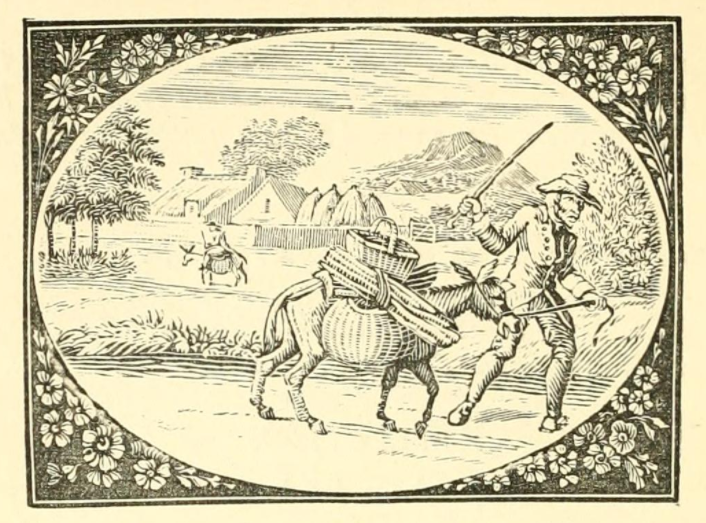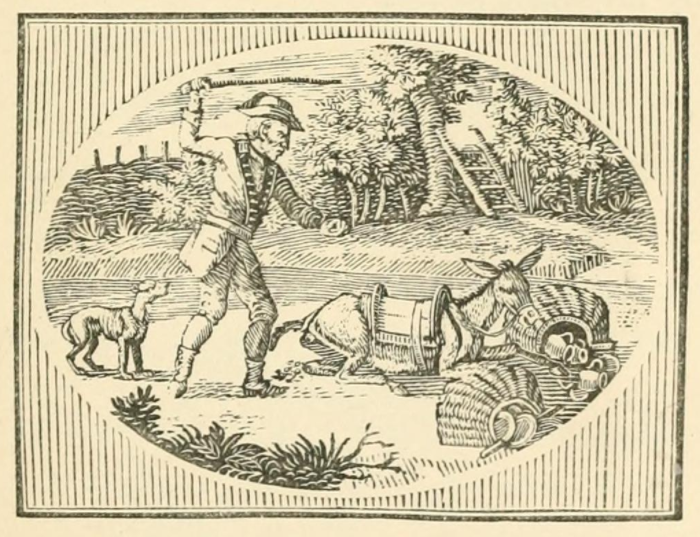136. Of an Ass Being Sick, and Wolves Visiting Him
An ass was sick, and report had gone out that he would die quickly; therefore, when the wolves had come to see him and asked of the son how his father did, he answered through the chink of the door, "Better than ye would have him."
Moral. This fable shows that many feign to bear the death of others with trouble, whom yet they desire to perish quickly.
137. Of a Nut-Tree, an Ass, and a Woman
A certain woman asked a nut-tree growing by the wayside, which was beaten with stones by the people passing by, why it was so mad that by how much it was beaten with more and greater stripes, by so much it yielded more and better fruits? To whom it said, "Art thou unmindful of the proverb saying thus: a nut-tree, an ass, and a woman are bound by a like law. These three do nothing rightly if blows cease."
Moral. This fable shows taht men often are wont to wound themselves with their own darts.
138. Of an Ass, Not Finding an End of His Labors
An ass was grieved very much in winter time that he was affected with too much cold and had hard meat of chaff, wherefore he desired the spring season and the tender grass. But when spring came and he was compelled by the master, who was a a potter, to carry clay into the yard and wood to the furnace, and thence bricks and tiles to diverse places. Tired of the spring, in which he bore so many labors, he hoped for summer, that the master, being hindered by the harvest, would suffer him to rest, but then also, when he was compelled to bear the corn into the barn, and thence the wheat home, nor was there space for rest for him. At least he hoped tha tautumn would be the end of his labors, but, when not then also he perceived an end of evils, seeing that daily wine, apples, and wood were to be carried, again he desired the snow and ice of winter, that then at least some rest might be granted to him from such great labors.
Moral. This fable shows that there are no times of the present life which are not subject to perpetual labors.

139. Of a Mouse Who Was Willing to Contract Friendship with a Cat
Many mice dwelling in the hollow of a wall, espied a cat, who lay on the boarded floor, with her head hung down, and a sad countenance. Then one of them said, this animal seems very kind and milkd; for she shows a certain sanctity in her very countenance; I am willing to speak to her and to knit an indissoluble friendship with her; which things when he had said, and had approached nearer, he was taken and torn to pieces by the cat. Then the rest, seeing this, said wish themselves, truly we must not trust rashly to the countenance.
Moral. This fable hints that men are not to be judged by the countenance, but by actions: seeing that fierce wolves often lie hid under a sheep's skin.
140. Of an Ass, Who Served an Ungrateful Master
An ass, who had served an ungrateful master many years with an inoffensive foot, once, as it happens while he was pressed with a heavy load, and went in an uneven way, fell under the burden. Then the implacable master compelled him to rise with many blows, calling him an idle and dull animal. But the miserable ass said with himself, among these stripes, unhappy I, who have got so ungrateful a master! For although I have served him a long time without offence, yet he does not weigh this one fault with my so many former benefits.
Moral. This fable was feigned against those who unmindful of benefits conferred on them prosecute even the least offence of their benefactor with cruel punishment.

No comments:
Post a Comment
Comments are limited to Google accounts. You can also email me at laurakgibbs@gmail.com or find me at Twitter, @OnlineCrsLady.